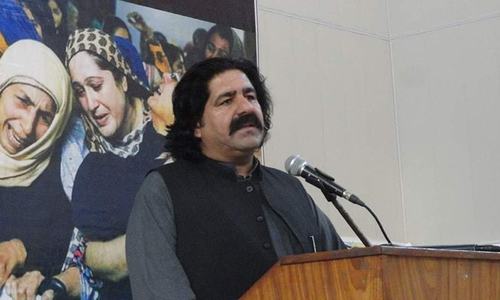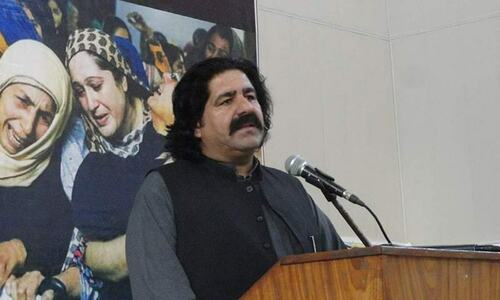ISLAMABAD: The Supreme Court bench, which had transferred the bail plea of Pashtun Tahafuz Movement (PTM) leader Mohammad Ali Wazir to another bench, will now hear the same appeal on Tuesday (today).
Justice Sardar Tariq Masood, who headed the three-judge bench which ordered the transfer, observed on Monday that the case was inadvertently fixed for hearing before a different bench.
Under the previous schedule, the appeal was due for hearing by a bench headed by Justice Umar Ata Bandial on Monday.
A notice issued by the Supreme Court office stated that the case fixed before the three-judge bench under Justice Bandial had been delisted because Justice Sajjad Ali Shah, a member of the bench, was not available for hearing.
Mohsin Dawar, another PTM leader and member of the National Assembly, appeared before the bench of Justice Sardar Tariq Masood on Monday and was told that the case was fixed before a different bench by mistake.
Mohsin Dawar told the judge that Salahuddin Khan Gandapur, the counsel for Ali Wazir, was out of Islamabad too. The hearing was adjourned to Tuesday on the PTM chief’s request.
Ali Wazir, an MNA, was arrested on charges of making incendiary speeches against state institutions at a public meeting in Karachi on December 6 last year. The first information report (FIR) against him was lodged at Sohrab Goth police station the same day.
The MNA pleaded with the apex court to set aside the Sindh High Court order since it was not sustainable under the law, adding that he was innocent and did not commit the offence mentioned in the FIR.
Furthermore, the petitioner argued, the SHC and the Anti- Terrorism Court (ATC) “failed to appreciate that witnesses named in the FIR were not independent witnesses. They were police personnel and therefore interested witnesses”.
The petition recalled that the FIR did not name any independent witness from the area where the public meeting was held. “It won’t be wrong to assume that the petitioner (Ali Wazir) has been implicated in a false case.”
The petitioner stated further that he had no criminal history and no cases were pending against him. There was no independent evidence to connect the appellant with the alleged offences of criminal conspiracy, waging war against the state, assaulting the president, the governor, promoting enmity between linguistic groups and spreading rumours with the intent to incite mutiny.
Published in Dawn, November 30th, 2021














































